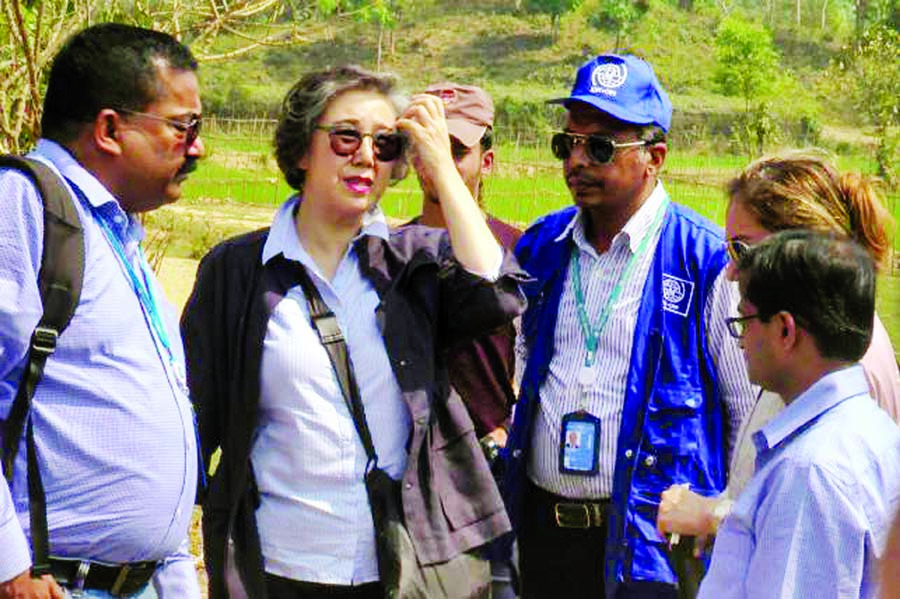
UN Special Rapporteur on the situation of human rights in Myanmar Yanghee Lee will soon visit Bhashan Char, an Island in Noakhali where the government has planned to shift Rohingyas, to see the situation on the ground.
Lee, who arrived here on Saturday, is now visiting Cox’s Bazar to see for herself the Rohingya situation there amid Myanmar’s continued denial to her access to Rakhine State. The UN Special Rapporteur has already rescheduled her press conference for Friday instead of Thursday. “Change date for Press Conference to 25 January. Due to access to Bashan Char island! Watch live too!,” she tweeted on Wednesday afternoon.
She is likely to leave Cox’s Bazar today to go to the Island, said an official. The UN Special Rapporteur arrived here from Thailand where she has been since January 14. Lee will present her findings and recommendations at the 40th session of the Human Rights Council in March 2019.
The Myanmar government has maintained its decision to cease cooperation with the Special Rapporteur, and refused her entry into Myanmar. Earlier on Sunday, Foreign Minister Dr AK Abdul Momen said the government will take all the interested foreigners, including diplomats, to Bhashan Char in Noakhali to see the situation on the ground once the work is completed there. “We’re very open. We’re not in any hide-and-seek. Let’s finish the work first,” he told reporters at his ministry. He said this is “not correct” that the government is not allowing visiting UN Special Rapporteur on the situation of human rights in Myanmar Yanghee Lee to go to the island. The UN Special Rapporteur met Foreign Minister Dr Momen at his office on Sunday and discussed issues related to Rohingya crisis. Talking to reporters, she said it was a fruitful meeting and hoped that her office will collaborate and work together with the office of the Foreign Minister of Bangladesh to help address the Rohibgya crisis. Lee, who earlier said incidents in Rakhine State bear the “hallmarks of genocide” and called for accountability in the strongest terms, also wanted to visit the island of Bhashan Char in Noakhali.
Asked about Myanmar’s denial to give Lee access in Rakhine, the Foreign Minister said though she is denied today, Myanmar may invite her tomorrow which is possible in this world. Terming Lee as a prominent person, Minister Dr Momen said her commitment is very strong towards Rohingya issue. The Foreign Minister said the Rohingya issue is a big problem that Bangladesh is facing now and Bangladesh wants its early solution.
“It’s good if we can resolve it quickly. But the delay might create uncertainty,” he said mentioning that the delay in resolving that problem might affect other countries in the region including Bangladesh, India and Myanmar. The Foreign Minister said Bangladesh needs more from all the countries and he sought similar support from Japan, too. “They’ve (Japan) much leverage on Myanmar.” Terming Myanmar also a friend of Bangladesh, Minister Dr Momen said this single (Rohingya) issue pushed Bangladesh into a problem as Bangladesh is hosting over 11 lakh Rohingyas. “It’s not the responsibility of Bangladesh alone to send them back and resolve their problems. But it’s a responsibility of all people and all the countries in the world,” said Minister Momen. Asked whether he is frustrated due to delay in commencing the repatriation, he said the process is slow but he never gets frustrated. “I’m optimistic. I believe there is a solution to every crisis. You need to have patience. There’re some tasks which are not just like turning on and off of an electric switch,” DrMomen said adding they are thinking afresh how to find a solution. “I still seek to engage with the Myanmar government and I remain committed to my mandate to monitor the situation of human rights in Myanmar. I’ll continue to meet with people from Myanmar and speak out about human rights issues that occur around the country,” said Lee in a statement announcing her Thailand and Bangladesh visits.
The Rohingyas in Cox’s Bazar are the victims of human rights violations committed in the midst of the violence that erupted in August 2017 forcing over 800,000 Rohingyas to take shelter in Bangladesh.
These Rohingya people have been living in camps administered by UNHCR and the government of Bangladesh with support from a slew of UN agencies and international NGOs since August 2017.

